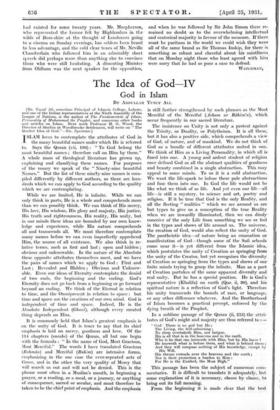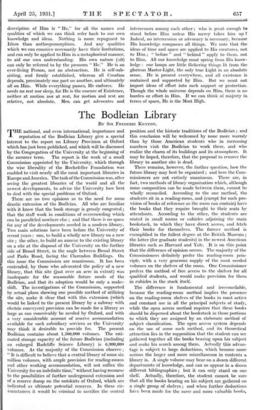The Idea of God TV God in Islam
BY ABDULLAH YUSUF ALT.
[Mr. Yusuf Ali, sometime Principal of Islamia College, Lahore, and one of the Indian representatives at the Ninth Assembly of the League of Nations, is the author of The Fundamentals of Islam, Personality of Muhammad the Prophet, and numerous other books and articles on Islam. Next week Professor H. G. Wood, the Director of Studies at Woodbrooke Settlement, will write on " The Quaker Idea of God."—En. Spectator.] ISLAM loves to contemplate the attributes of God in the many beautiful names under which He is referred to. Says the Quran (vii, 180) : " To God belong the most beautiful names ; therefore call on Him by them." A whole mass of theological literature has grown up, explaining and classifying these names. For purposes of the rosary we speak of the " Ninety-nine beautiful Names." But the list of these ninety-nine names is com- piled differently by different authors, as there are hun- dreds which we can apply to God according to the quality which we are contemplating.
While we are limited, He is infinite. While we can only think in parts, He is a whole and comprehends more than we can possibly think. We can think of His mercy, His love, His wisdom, His glory and majesty, His justice, His truth and righteousness, His reality, His unity, but in our minds these ideas are bounded by our own know- ledge and experience, while His nature comprehends all and transcends all. We must therefore contemplate many names before we can even imperfectly apprehend Him, the source of all existence. We also think in re- lative terms, such as first and last ; open and hidden ; obvious and unknowable. In the nature of the Absolute these opposite attributes themselves meet, and we have the pairs of names which we apply to God : First and Last ; Revealed and Hidden ; Obvious and Unknow- able. Even our ideas of Eternity contemplate the denial of two ends, the beginning and the ending. God's Eternity does not go back from a beginning or go forward beyond an ending. We think of the Eternal in relation to time; and the Omnipresent in relation to space : but time and space are the creations of our own Mind. God is independent of time and space. Indeed, He is the Absolute Independent (Ghani), although every created thing depends on Him.
It is commonly held that Islam's greatest emphasis is on the unity of God. It is truer to say that its chief emphasis is laid on mercy, goodness and love. Of the 114 chapters (surahs) of the Quran, all but one begin with the formula : " In the name of God, Most Gracious, Most Merciful." The words I have translated Gracious (Rahman) and Merciful (Rahim) are intensive forms, emphasizing in the one case the ever-repeated acts of Grace, and in the other the very quality of Mercy that will search us out and will not be denied. This is the phrase most often in a Muslim's mouth, in beginning a prayer, or a reading, or a meal, or a journey, or anything of consequence, sacred or secular, and must therefore be taken to be the chief point of emphasis. And the emphasis is still further strengthened by such phrases as the Most Merciful of the Merciful (Arham yr Reihinu-n), which occur frequently in our sacred literature.
The insistence on Unity is not only a protest against the Trinity, or Duality, or Polytheism. It is all these, but it has also a positive side, which comprehends a view of God, of nature, and of mankind. We do not think of God as a bundle of different attributes united in one. We think of Him as a Living Personality, in which all is fused into one. A young and ardent student of religion once defined God as all the abstract qualities of goodness and beauty combined in a single abstraction. This may appeal to some minds. To us it is a cold abstraction. We want the life-spark to infuse these pale abstractions and fuse them into one. In God the life would not be like what we think of as life. And yet even our life—all life—is still a mystery, to science and art, poetry and religion. If it be true that God is the only Reality, and all the fleeting " realities " which we see around us are but types to give us a conception of the true Reality when we are inwardly illuminated, then we can dimly" conceive of the only Life from something we see or feel in the types and shows of life around us. The universe, the creation of God, would also reflect the unity of God. The pantheistic idea—of nature being an emanation or manifestation of God—though some of the Sufi schools come near it—is yet different from the Islamic idea, which postulates the unity of Creation as springing from the unity of the Creator, but yet recognizes the diversity of Creation as springing from the types and shows of our finite minds trying to grasp the infinite. Man as a part of Creation partakes of the same apparent diversity and real unity. But he has a special position. He is God's representative (Khalifa) on earth (Qur. ii, 30), and his spiritual nature is a reflection of God's light. Therefore his unity transcends the bounds of race, or language, or any other difference whatever. And the Brotherhood of Islam becomes a practical precept, enforced by the dying breath of the Prophet.
In a sublime passage of the Quran 255) the attri- butes of God's might and majesty are thus referred to :- " God • There is no god but He ;
The Living, the Self-subsisting ; No sleep overtaketh Him, nor fatigue.
His is all that is in the heavens and in the earth.
Who is he that can intercede with Him, but by His leave ? He knoweth what is before them, and what is behind them ; And they will compass nothing Of His knowledge, except by His Will.
His throne extends over the heavens and the earth ; Nor is their protection a burden to Him : For He is the Exalted, the Most High."
This passage has been the subject of numerous com- mentaries. It is difficult to translate it adequately, but some explanation of it is necessary, clause by clause, to bring out its full meaning.
From the beginning it is made clear that the best description of Him is " He," for all the names and qualities of which we can think refer back to our own knowledge and ideas. Nothing is more repugnant to Islam than anthropomorphism. And any qualities which we can conceive necessarily have their limitations, and can only be applied to Him in a metaphorical Manner, to aid our own understanding. His own nature (rat) can only be referred to by the pronoun " He." He is an ever-living Person, not an abstraction. He is self-sub- sisting, and firmly established, whereas all Creation depends, proximately one part on another, and ultimately all on Him. While everything passes, He endures. He needs no rest nor sleep, for He is the essence of Existence, neither at motion nor at rest, for motion and rest are relative, not absolute. Men can get advocates and intercessors- among each other ; who is great enough to stand before Him unless His mercy takes him up ? Indeed, no intercession or advocacy is necessary, because His knowledge compasses all things. We note that the ideas of time and space are applied to His creatures, not to Him ; " before " and " behind " apply to them, not to Him. All our knowledge must spring from His know- ledge : our lamps are little flickering things lit from the glorious Master-Light, the only true Light in an absolute sense. He is present everywhere, and all existence is sustained and supported by Him. But we must not import ideas of effort into such support or protection. Though the whole universe depends on Him, there is no burden or effort in Him. If we can think of majesty in terms of space, He is the Most High.







































 Previous page
Previous page